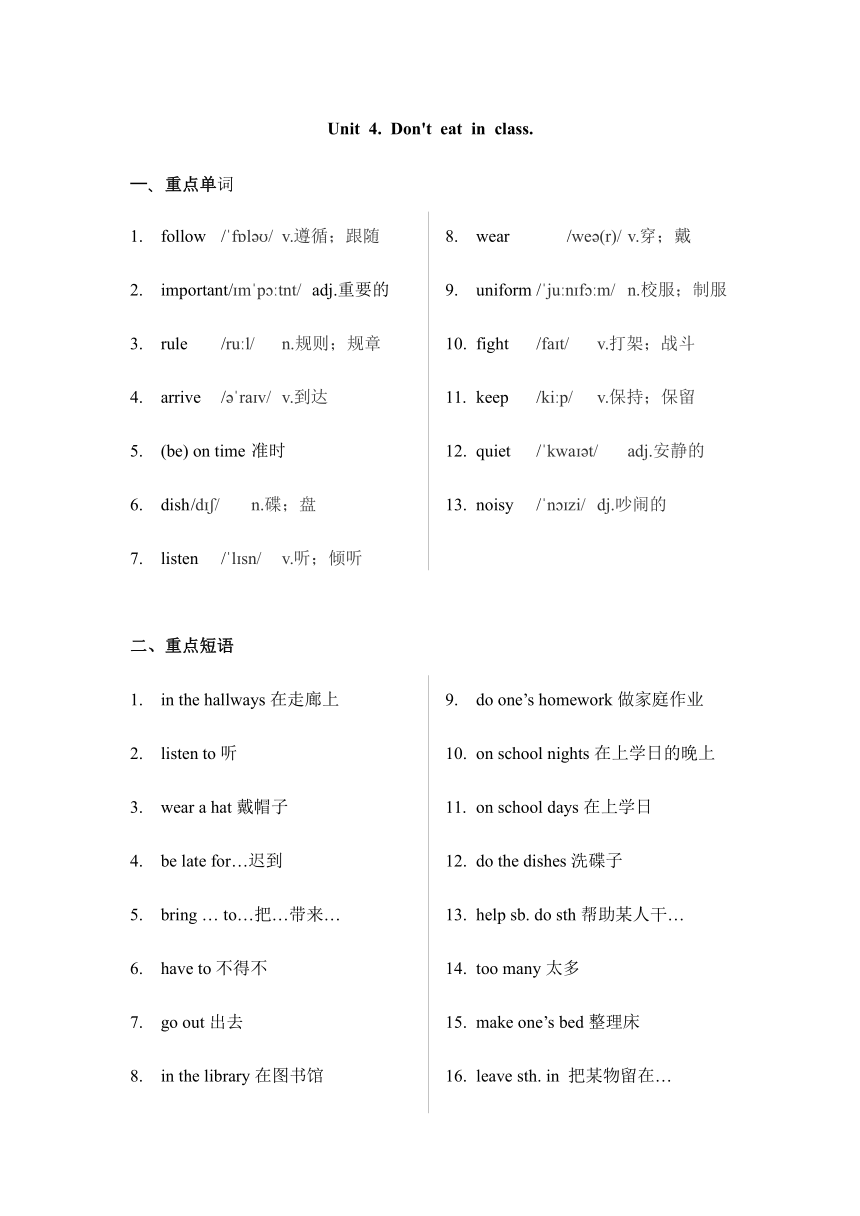
Unit 4. Don't eat in class. 重点单词 follow / f l / v.遵循;跟随 important/ m p tnt/ adj.重要的 rule /ru l/ n.规则;规章 arrive / ra v/ v.到达 (be) on time 准时 dish /d / n.碟;盘 listen / l sn/ v.听;倾听 wear /we (r)/ v.穿;戴 uniform / ju n f m/ n.校服;制服 fight /fa t/ v.打架;战斗 keep /ki p/ v.保持;保留 quiet / kwa t/ adj.安静的 noisy / n zi/ dj.吵闹的 二、重点短语 in the hallways在走廊上 listen to听 wear a hat戴帽子 be late for…迟到 bring … to…把…带来… have to不得不 go out出去 in the library在图书馆 do one’s homework做家庭作业 on school nights在上学日的晚上 on school days在上学日 do the dishes洗碟子 help sb. do sth帮助某人干… too many太多 make one’s bed整理床 leave sth. in 把某物留在… on weekends在周末 read a book读书 go to bed去睡觉 make rules定规则 follow the rules遵守法则 keep my hair short留短发 learn to do sth.学习… 三、句型所含知识点解析 1. Don’t arrive late for class. You must be on time. 2. Dave has to practice the guitar. 3. Don’t fight. 4. Can we bring music players to school 5. And we always have to wear the school uniform. 6. Dave has to help his mom make breakfast. 7. There are too many rules! 8. After dinner, I can’t relax either. 9. Parents and schools are sometimes strict, but remember, they make rules to help us. 10. So students have to follow the rules. 11. I have to keep my hair short. 12. I can’t relax on weekends either because I must learn to play the piano. 解析版 1. Don’t arrive late for class. You must be on time. arrive late for意为“迟到”,侧重到达的时间晚; be late for侧重于状态。 2. Dave has to practice the guitar. practice作动词或名词,意为“练习” “practice (doing) sth.练习(做)某事”;从名词时,常做不可数名词。 3. Don’t fight. fight作动词或名词,意为“打架、打仗”,其过去式为不规则fought。 fight for意为“为…而斗争”,后面常接抽象名词,表示为事业、自由等而斗争 fight against意为“为反对…而战斗”,后接事物名词、人和国家名词。 fight with 意为“和…打架,同…(并肩)战斗,对抗”,后只接表示人或国家的名词。 fight about 意为“为...争吵”,强调吵架的原因 4. Can we bring music players to school bring作动词,意为“带来”,强调把东西从别处带到说话地。 take意为“带走,拿走”,强调把东西从说话地带到别的地方。 5. And we always have to wear the school uniform. have to侧重于客观上的必要,必须,意为“不得不做某事”,后跟动词原形 肯定句—sb +have/has to+动词原形。 否定句—sb +don’t/doesn’t have to+动词原形。 一般疑问句—Does/Do +sb. +have to+动词原形? 肯定回�———Yes, …do/does. 否定回�———No, …don’t/doesn’t. 特殊疑问句—特殊疑问词+do/does +sb. +have to +动词原形? 6. Dave has to help his mom make breakfast. help作动词,意为“帮助”,亦可作不可数名词。 “help sb (to) do sth.帮助某人做某事 help sb with sth.帮助某人做某事 help oneself(myself/yourself/herself…) to+n.请随便用…”。 7. There are too many rules! 形容词短语too many意为“太多”,后跟可数名词复数。 辨析too many, too much和much too的用法 too many 太多 形容词短语,修饰可数名词复数 too much 太多 形容词短语,修饰不可数名词 much too 太,非常 ... ...
~~ 您好,已阅读到文档的结尾了 ~~